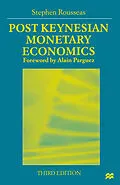A Post Keynesian critique of monetarism and of contemporary Keynesian theory, calling for a return to the original ideas of John Maynard Keynes. Its primary emphasis is on the endogeneity of the money supply and on the financial innovations that have served to limit the effectiveness of monetary policy. It calls for the addition of a selective control over the flow of credit in the economy as an addition to the conventional Keynesian contracyclical tools for keeping the economy at full employment, along with a recognition that inflation is a function of money wages and not the aggregate supply or money.
Autorentext
STEPHEN ROUSSEAS is the Dexter M. Ferry Jr Emeritus Professor of Economics at Vassar College. He has taught at Columbia University, the University of Michigan, Yale University, Cornell University, and New York University. Professor Rousseas is the author of The Death of Democracy: Greece and the American Conscience, Monetary Theory, Capitalism and Catastrophe: A Critical Appraisal of the Limits of Capitalism, The Political Economy of Reaganomics: A Critique, and numerous articles and reviews.
Inhalt
Preface Introduction The Peculiarity of Money The Demand for Money and the Rate of Interest The Endogenous Money Supply The Weintraub-Kaldor Models of Endogeneity The Policy Implications of Post Keynesian Monetary Theory Bibliography Index
